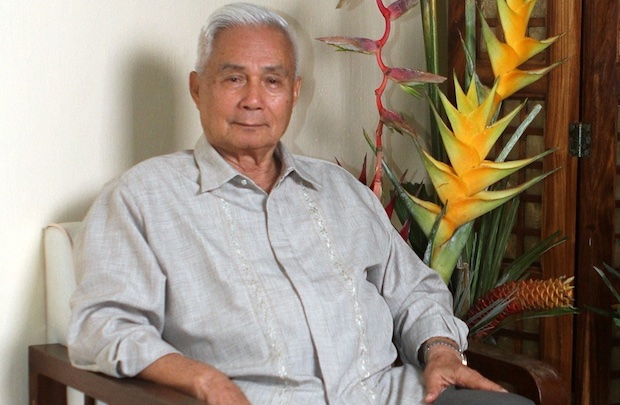
Dr. Angel C. Alcala (Photo from his Facebook page)
DUMAGUETE CITY, Negros Oriental, Philippines — Fisherfolk from Apo Island took a 45-minute boat ride to this city to join environmentalists, residents, and the academic community in paying their last respects to National Scientist Angel Alcala, whom many in coastal villages in Negros Oriental consider as their “hero.”
In a Facebook post on Feb. 5, former Apo Island village chief Liberty Pascobello Rhodes thanked Alcala, who died on Feb. 1 at the age of 93, for sharing his knowledge about marine resources and their preservation with her fishing community, remembering the scientist’s visits during her teens.
“You are our hero because, with you, people on Apo Island now have better lives and a better future,” said the 62-year-old Rhodes.
Alcala’s wake is held at Silliman University (SU) here. The National Academy for Science and Technology will lead the state funeral for Alcala, also a former secretary of the Department of Environment and Natural Resources, on Friday.
As a national scientist, Alcala could have been interred at Libingan ng mga Bayani. However, his family opted to have his remains buried at The Gardens Memorial Park here.
Alcala, a Filipino biologist who was named national scientist in 2014, was known for his fieldwork, building sanctuaries and promoting biodiversity in the aquatic ecosystems of the country.
Protecting marine resources
Mary Aldeon, one of the members of the Development Women Active Network which Alcala helped establish in the 1980s, said she first heard about the scientist’s work when she was 22.
At that time, she said Alcala went to Barangay Apo Island, off the coast of the southern town of Dauin, to talk to them about their marine resources.
Alcala, she said, had told them they did not have to stay home as housewives all day, as they could take an active role in the fishing industry.
Aldeon, now 64, manages five bancas (small boats with outriggers) that shuttle residents, divers, and other guests between Apo Island and its jump-off point at Malatapay in Zamboanguita town.
“We were so innocent when Dr. Alcala first taught us the value of industry in a fishing village, and how to care for our resources,” she said.
The fish catch was abundant around Apo Island at that time but most fishers were into cyanide fishing and “muro-ami,” the now-illegal fishing technique where even the fishers’ children pound on the coral reefs and drive the fish into the nets.
At that time, many fishers on Apo Island believed that the scientists from SU’s Marine Laboratory, now the Institute of Environmental and Marine Sciences, led by Alcala and social workers just wanted to buy their island and make it another Silliman property.
But Alcala persisted despite rumors in the community. He continued to talk to the people, telling them that keeping a quarter of their marine area off-limits to fishing activities provided space where the fish could spawn and reproduce and eventually yield more and bigger fish.
Former Environment Undersecretary Ben Malayang III said Alcala was one person who was “not easy to give up on what he saw was the truth.”
On Wednesday, faculty and students of the SU Institute of Environmental and Marine Sciences took turns extolling the virtues of Alcala, the founder of the university’s research facility.
“There is a planet needing to be healed and saved,” said Hilconida Calumpong, former director of the SU Marine Laboratory.
Simple man
Another faculty member, Aileen Maypa, remembered how Alcala challenged her to take her doctorate.
“Fish is our primary resource; our country needs people who know fish,” said Maypa, recalling Alcala’s words.
Mario Pascobello, 58, village chief of Apo Island, said he was only 7 years old when he met Alcala in their community.
“He was a very simple man. He would just sleep on the beach or inside the old chapel when it rained,” he said.
At night, Alcala would set up a black-and-white television attached to a small power generator set.
“It was our first time watching television. Sir Alcala would show movies about fishes, corals, and the life of fishermen in the Philippines. Afterward, he would explain to us what we had just watched,” Pascobello said.
“His advocacy for the marine environment transformed me and my family from being reef destroyers to reef rangers,” he added.